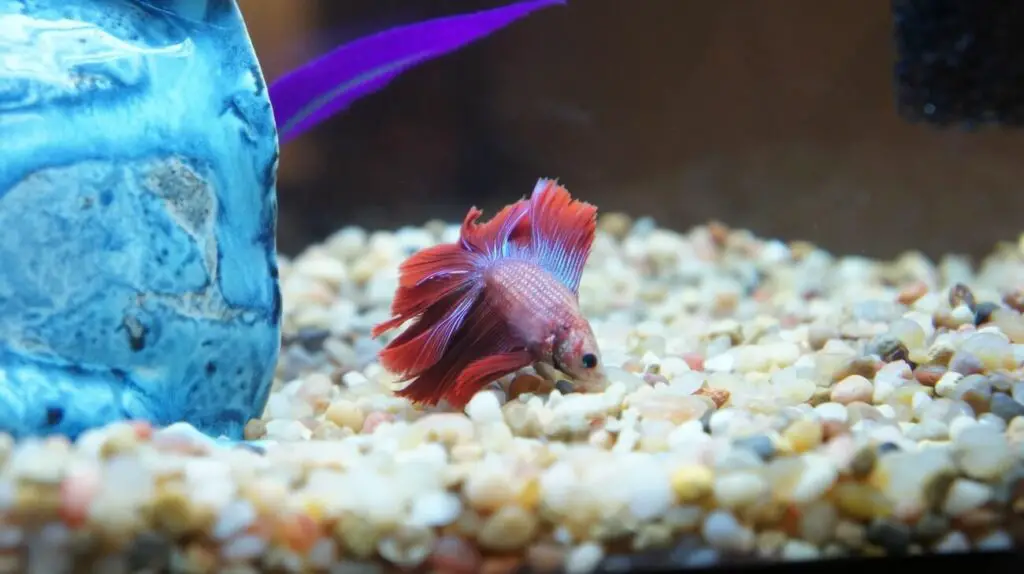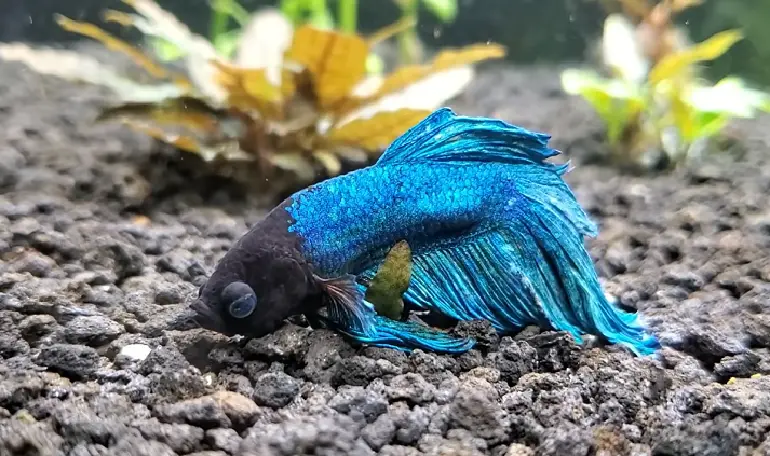Betta fish are undoubtedly a popular choice for people who love to keep fish as pets in their homes. These colorful and vibrant fish are known for their unique personalities and behaviors, which often leave their owners wondering about their habits. One of the most commonly asked questions by betta fish owners is whether their fish sleep at the bottom of the tank.
The answer to this question is not as straightforward as one might expect. While some betta fish might sleep at the bottom of the tank, others might prefer to rest in other parts of the tank. In this article, we will explore the sleeping habits of betta fish and provide you with some interesting insights into their behavior. So, let’s dive in and find out if betta fish really do sleep at the bottom of the tank.
Yes, Betta fish do sleep at the bottom of the tank. They may also sleep on the leaves of plants or on any surface that they feel comfortable with. Betta fish are known to be active during the day and rest during the night. It is important to provide Betta fish with a comfortable and safe environment to sleep in, such as a soft substrate at the bottom of the tank.

Do Betta Fish Sleep at the Bottom of the Tank?
Betta fish, also known as Siamese fighting fish, are one of the most popular aquarium fish around the world. They are known for their vibrant colors and beautiful fins, which make them a favorite among fish enthusiasts. But have you ever wondered where they sleep? Do they sleep at the bottom of the tank? In this article, we will explore the sleeping habits of betta fish and find out if they really sleep at the bottom of the tank.
Do Betta Fish Sleep?
Yes, betta fish do sleep, just like any other living creature. However, their sleeping habits are different from other fish. Betta fish are known to be active during the day and rest at night. They usually sleep for a few hours at a time, and their sleep is usually broken up into short periods. During their sleep, they may become less active and may even appear to be motionless, which might make you think that they are dead. However, they are just sleeping.
Where do Betta Fish Sleep?
Betta fish are known to prefer sleeping near the surface of the water. They have a special organ called the labyrinth organ, which enables them to breathe air from the surface of the water. This allows them to rest near the surface of the water without having to swim to the bottom of the tank to breathe. However, they can also sleep at the bottom of the tank, depending on their mood and the environment they are in.
Do Betta Fish Sleep at the Bottom of the Tank?
As mentioned earlier, betta fish can sleep at the bottom of the tank, but it is not their preferred sleeping spot. If you see your betta fish sleeping at the bottom of the tank, it could be a sign of stress or illness. You should check the water parameters and make sure the water temperature, pH, and ammonia levels are within the acceptable range. If there are any issues, you should take the necessary steps to fix them.
Benefits of Providing a Proper Sleeping Environment for Betta Fish
Providing a proper sleeping environment for your betta fish can have many benefits. It can help reduce stress, improve their overall health, and increase their lifespan. Betta fish that are well-rested are more active and alert during the day, which can make them more enjoyable to watch.
How to Create a Suitable Sleeping Environment for Betta Fish
To create a suitable sleeping environment for your betta fish, you should provide them with a comfortable and safe place to rest. You can add plants, rocks, or other decorations to the tank to create hiding spots where your betta fish can sleep. You should also ensure that the water is clean and the temperature is consistent.
Betta Fish Sleep vs Other Fish Sleep
Betta fish sleep habits are different from other fish. Most fish are active during the day and rest at night. However, betta fish are active during the day and rest at night. They also have the unique ability to breathe air from the surface of the water, which allows them to sleep near the surface of the water.
Conclusion
In conclusion, betta fish do sleep, just like any other living creature. They prefer to sleep near the surface of the water, but they can also sleep at the bottom of the tank. Providing a proper sleeping environment for your betta fish can have many benefits and can help improve their overall health and well-being. If you notice your betta fish sleeping at the bottom of the tank, it could be a sign of stress or illness, and you should take the necessary steps to fix any issues.
Frequently Asked Questions
Do Betta Fish Sleep at the Bottom of the Tank?
Yes, betta fish may sleep at the bottom of the tank. However, it is important to note that they do not have eyelids like humans and other animals. This means that they do not close their eyes when they sleep.
When betta fish sleep, they may appear to be inactive or resting at the bottom of the tank. They may also hide in plants or other aquarium decorations. It is important to monitor your betta fish’s behavior and ensure that they are not experiencing any health issues.
How Long Do Betta Fish Sleep?
Betta fish typically sleep for several hours each day, but the amount of time can vary. Some betta fish may sleep for longer periods, while others may be more active throughout the day and sleep less. It is important to provide your betta fish with a comfortable and secure environment to help them feel safe and encourage healthy sleep habits.
Factors such as water temperature, lighting, and diet can also affect a betta fish’s sleep patterns. It is important to maintain a consistent routine for your betta fish to help them establish healthy sleep habits.
What Are Some Signs That My Betta Fish Is Sleeping?
Some signs that your betta fish may be sleeping include resting at the bottom of the tank, hiding in plants or other aquarium decorations, and appearing inactive. However, it is important to note that betta fish do not have eyelids and may not exhibit traditional signs of sleep like closing their eyes.
If you are concerned about your betta fish’s behavior or health, it is important to monitor them closely and consult with a veterinarian or experienced fish keeper. They can help you identify any potential issues and provide guidance on how to care for your betta fish.
Do Betta Fish Need Darkness to Sleep?
Betta fish do not require complete darkness to sleep, but they may benefit from a consistent lighting schedule. Providing your betta fish with a regular light-dark cycle can help them establish healthy sleep patterns and reduce stress.
It is also important to avoid sudden changes in lighting or noise levels in your betta fish’s environment. Sudden changes can disrupt their sleep and cause stress or other health issues. By providing your betta fish with a comfortable and consistent environment, you can help them feel safe and encourage healthy sleep habits.
How Can I Create a Comfortable Environment for My Betta Fish to Sleep?
To create a comfortable environment for your betta fish to sleep, it is important to provide them with a secure and well-maintained tank. This includes regular water changes, proper filtration, and appropriate tank decorations.
You can also provide your betta fish with a quiet and low-stress environment by avoiding sudden changes in lighting or noise levels. Providing a consistent light-dark cycle and a comfortable water temperature can also help your betta fish establish healthy sleep patterns.

4 Reasons Why Betta Fish Lay At The Bottom Of The Tank
In conclusion, the question of whether or not betta fish sleep at the bottom of the tank is a complicated one. While it is true that bettas are known to rest on the substrate, this behavior is not necessarily indicative of sleep. It is more likely that bettas are simply taking a break from swimming and conserving energy.
Furthermore, it is important to remember that bettas are highly adaptive creatures, and their behavior can vary depending on a variety of factors, including water conditions, tank size, and the presence of other fish. Therefore, it is difficult to make a definitive statement about their sleeping habits.
Overall, the key takeaway is to observe your betta’s behavior closely and make adjustments to their tank environment as needed. By providing them with a comfortable and stimulating living space, you can help ensure that your betta stays healthy and happy for years to come.
